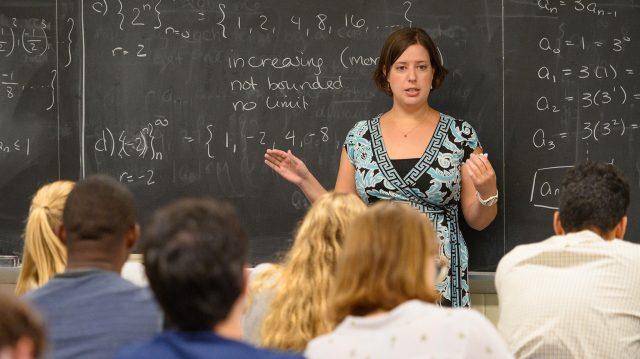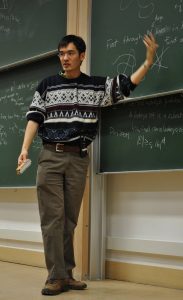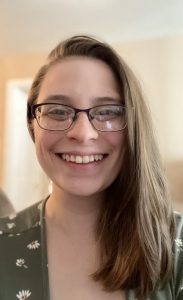
Mathematics professor Ayla Gafni teaches a class in Hume Hall. Gafni, who is involved in cutting-edge research in number theory, has been awarded a $210,430 fellowship that will enable her to work with a world-class research group at UCLA. Photo by Robert Jordan/Ole Miss Digital Imaging Services
OXFORD, Miss. – Ayla Gafni, assistant professor of mathematics at the University of Mississippi, has been named a research fellow by the National Science Foundation‘s Established Program to Stimulate Competitive Research, known as EPSCoR.
Her fellowship supports extended visits to the University of California at Los Angeles, totaling six months over two years, beginning in April. Gafni plans to spend two summers at UCLA starting next year, accompanied by Katherine Bronicki, a UM doctoral student from Midland, Michigan.
They will collaborate with and gain research expertise in harmonic analysis from professor Terence Tao, who is known as the “Mozart of Math.”

Terence Tao, often called the ‘Mozart of Math’ earned his doctorate at age 20 and was granted tenure at UCLA at 24. Ole Miss mathematics professor Ayla Gafni plans to work with Tao on mathematics studies at UCLA as part of her EPSCoR research fellowship. Submitted photo
“This award will provide an incredible opportunity to foster new collaborations with one of the world’s top research groups,” Gafni said. “In doing so, I’ll learn and expand my research expertise in harmonic analysis, an area of mathematics that is currently lacking in the state of Mississippi.”
Tao is considered one of the world’s greatest mathematicians, so conducting research under his supervision means being part of a world-class research group.
“Our research groups in analysis and number theory at the UCLA Department of Mathematics are very much looking forward to working with Dr. Gafni, who brings valuable expertise and fresh perspectives in both fields, and I expect many productive collaborations to emerge during her time with us while supported by the EPSCoR fellowship,” Tao said.
EPSCoR research fellowships are designed to have transformative impacts on the fellows’ careers, and they also improve the research capacity at each fellow’s home institution or state.
The entire active analytic number theory group at UM should benefit from Gafni’s fellowship. One of her requirements is to develop two courses in harmonic analysis, one for undergraduates and another for the graduate level.
The new courses will enhance graduate and undergraduate education as the first of their kind at the university. Both courses will equip Ole Miss students with valuable tools to become more effective mathematicians, scientists, and engineers.
The undergraduate course will be useful to mathematics majors planning to go into industry. It also should interest science and engineering students studying signal processing and data transfers.
Such courses are important to helping students discover a love for mathematics, Bronicki said.

Katherine Bronicki, a UM doctoral student expected to complete her studies in 2026, plans to accompany professor Ayla Gafni to UCLA. Submitted photo
“I came into undergrad as a computer science major,” she said. “In my first semester, I took a ‘discrete math for computer science’ class, and I loved it.
“I realized that I cared more about math than the application that computer science provided, and as I continued, I just really fell in love with the beauty of pure mathematics.”
In its seventh yearly competition cycle, the NSF EPSCoR research fellows program is a competitive “limited submission” opportunity. The fellowship supports early-to-mid-career researchers and provides extended or numerous collaborative visits to private, government or academic research centers that are beyond reasonable commuting distance.
Gafni had to compete and be selected from within the university before being considered by the NSF. She is the third faculty member from the Department of Mathematics to win one of these grants.
The fellowship with Tao is not the first time Gafni has engaged with one of the world’s top mathematicians. Some of her earlier work inspired Manjul Bhargava, winner of a prestigious Fields Medal, to solve a problem that had been open for 80 years.
Gafni is a renowned an innovative researcher who has presented her work worldwide. She has been published by respected journals in her field, and she has authored or co-authored a handful of published papers.
She earned her doctorate from Pennsylvania State University in 2016 and joined the UM faculty in 2019. She received her first research award, a Ralph E. Powe Junior Faculty Enhancement Award from the Oak Ridge Associated Universities, in 2020.
This material is based upon work supported by the National Science Foundation under Grant No. 2229278.